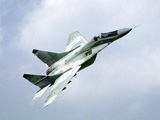|
|
TODAY.AZ / Politics
Azerbaijan shows MIG-29 fighter jets
29 March 2007 [12:54] - TODAY.AZ

MIG-29 fighter aircrafts (by NATO classification Fulcrum) and helicopters made air-show on Tagiyev base, APA reports.
MIG-29 fighters were made in Ukraine. MiG-29 export customers have included most of post-Soviet countries and some NATO members.
Developed in late 1960s, the MIGs entered service in 1983 and remains in use by the Russian Air Forces as well as in many other nations.
In the West, the new fighter was then given the NATO reporting name "Fulcrum".
The MiG-29 has two widely spaced Klimov RD-33 turbofan engines, each rated at 50.0 kN dry and 81.3 kN in afterburner. The space between the engines generates lift, thereby reducing effective wing leading, to improve maneuverability. The engines are fed through wedge-type intakes fitted under the LERXs, which have variable ramps to allow high-Mach speeds (2,445 km/h (1,518 mph).
Armament for the MiG-29 includes a single GSh 30-1 30 mm cannon in the port wing root. This originally had a 150-round magazine. The inboard pylons can carry either a 1,150 liter fuel tank, one R-27 medium-range air-to-air missile, or unguided bombs or rockets, the outer pylons usually carry R-73 dogfight missiles, although some users still retain the older R-60.
The MiG-29 first saw action in the 1980s during the Iran-Iraq war, where unguided bombs and rockets were used to devastating effect. During the Soviet war in Afghanistan, a Soviet MiG-29 shot down an Afghan SU-20 Fitter.
During military operations in Yugoslavia MIG-29 shot down USA-made "invisible" stealth aircraft in ground-attack missions.
URL: http://www.today.az/news/politics/38475.html
 Print version
Print version
Connect with us. Get latest news and updates.
See Also
- 12 February 2026 [14:14]
Baku and Washington have passed a verdict on the 907th Amendment - 12 February 2026 [11:11]
Rhymes won't help! - 11 February 2026 [14:14]
United States takes over nuclear security of South Caucasus - 11 February 2026 [13:32]
President Ilham Aliyev chairs meeting on Azerbaijan's new digital architecture action plan - 11 February 2026 [12:43]
President Ilham Aliyev receives delegation headed by President of Arab Parliament - 11 February 2026 [12:41]
CBA, U.S. Chamber of Commerce discuss expanding financial and investment cooperation - 11 February 2026 [11:25]
President Ilham Aliyev sends congratulatory letter to President of Iran - 11 February 2026 [11:09]
Footage of President Ilham Aliyev's meeting with U.S. Vice President JD Vance posted on his social media - 11 February 2026 [10:43]
U.S. Vice President JD Vance pays tribute to Azerbaijani martyrs in Baku - 10 February 2026 [14:32]
President Ilham Aliyev appoints new chairman of State Statistical Committee - decree
Most Popular
 United States takes over nuclear security of South Caucasus
United States takes over nuclear security of South Caucasus
 G-77 and China Group hold plenary at UNESCO under Azerbaijan's chairmanship
G-77 and China Group hold plenary at UNESCO under Azerbaijan's chairmanship
 Baku and Washington have passed a verdict on the 907th Amendment
Baku and Washington have passed a verdict on the 907th Amendment
 Defense concludes in Ruben Vardanyan trial, final verdict pending
Defense concludes in Ruben Vardanyan trial, final verdict pending
 Reza Deghati's 'Rising Light' exhibition opens at Heydar Aliyev Int'l Airport
Reza Deghati's 'Rising Light' exhibition opens at Heydar Aliyev Int'l Airport
 Georgia targets completion of key transit highway linking Türkiye, Azerbaijan, and Armenia
Georgia targets completion of key transit highway linking Türkiye, Azerbaijan, and Armenia
 Israel's Herzog hopes US talks can topple Iran's 'evil empire'
Israel's Herzog hopes US talks can topple Iran's 'evil empire'
